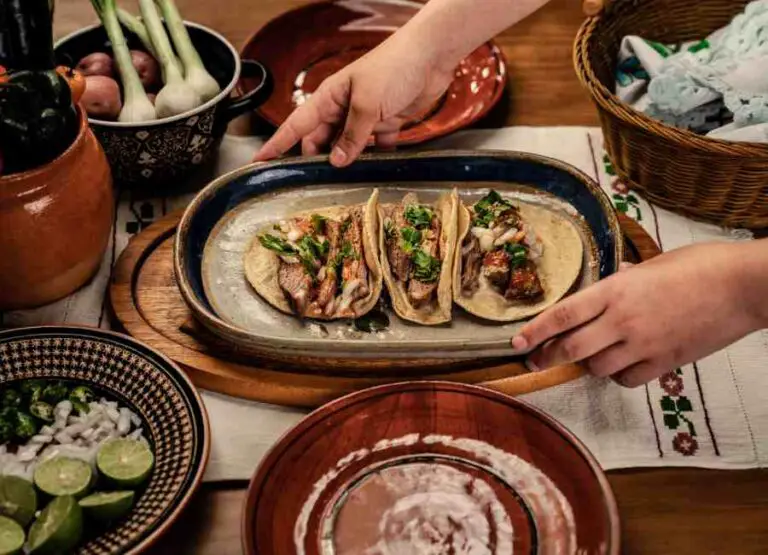Is Lunch Meat Processed Food [Answered]
Have you ever wondered if lunch meat is considered processed food? Well, the answer is yes!
Lunch meat typically goes through various preservation and processing methods, such as salting, smoking, and curing, to extend its shelf life.
But don’t worry, not all processed foods are bad for you!
Keep reading to learn more about this topic and how to make healthier choices when it comes to your lunch options.
Is Lunch Meat Processed Food
Yes, lunch meat is considered processed food.
Processed meats are meats that have been transformed through salting, curing, fermentation, smoking, or another process to enhance flavor or improve preservation.
Deli and lunch meats fall under this category of processed meats.
While there are various opinions on how unhealthy processed meats are for your health, they do tend to be higher in sodium and other additives.
It’s recommended to limit your intake of processed meats if possible and opt for fresh meats instead.
Why lunch meat is considered a processed food
Lunch meat is considered a processed food because it goes through a series of steps, such as curing, smoking, or adding preservatives, to extend its shelf life and improve its flavor.
These steps also change the texture and appearance of the meat.
Processed meats like lunch meat, hot dogs, bacon, and sausages are generally considered less healthy than unprocessed meats because they often contain higher levels of sodium, nitrates, and other additives.
Studies have also shown that consuming large amounts of processed meats may increase the risk of certain types of cancer and other health problems.
It is generally recommended to limit the consumption of processed meats and choose whole, unprocessed foods whenever possible.
Learn more about the dangers of leaving lunch meat outside overnight.
Health Concerns with Processed Food
Processed foods can have negative health effects, including contributing to the obesity epidemic and the rising prevalence of chronic diseases like heart disease and diabetes.
Heavily processed foods can increase cancer risk, be high in sugar, sodium, and fat, lack nutritional value, and be calorie-dense and addicting.
Processed meats have been classified as a class 1 carcinogen by the World Health Organization.
Chemically processed foods, also called ultra-processed foods, tend to be high in sugar, artificial ingredients, refined carbohydrates, and trans fats and are a major contributor to obesity and illness around the world.
However, not all processed foods are bad for the body, and some whole grain, ultra-processed foods can be an important source of fiber.
Learn more about eating lunch meat while pregnant.
Making healthy choices for your lunch options
Making healthy choices for your lunch options can be challenging, but there are some tips that can help.
Here are a few suggestions:
- Choose whole foods – Whole foods like fruits, vegetables, whole grains, and lean proteins are typically healthier than processed foods. Try to incorporate these foods into your lunches whenever possible.
- Avoid sugary drinks – Many drinks like soda and juice contain a lot of added sugars, which can contribute to weight gain and other health problems. Instead, opt for water, low-fat milk, or unsweetened tea.
- Pay attention to portion sizes – Eating too much can lead to overconsumption of calories, which can contribute to weight gain. Be mindful of how much you are eating and try to stick to appropriate portion sizes.
- Plan ahead – Planning out your meals ahead of time can help ensure that you have healthy options available. Consider meal prepping on the weekends or packing your lunch the night before to avoid choosing less healthy options on the go.
- Look for healthy options at restaurants – If you eat out for lunch often, look for restaurants that offer healthier options like salads or grilled proteins. Avoid fried or greasy foods.
Remember that making healthier choices is all about balance and moderation.
Try to incorporate healthier options into your diet gradually and enjoy the occasional treat in moderation.
Alternatives to Lunch Meat
Here are some common alternatives to lunch meat:
- Jackfruit: Jackfruit is a fruit native to Asia and Africa, and has a texture similar to pulled pork. It is a good source of vitamin C and potassium and is cholesterol-free.
- Tofu: Tofu is a protein-rich food made from soybeans. It absorbs flavors well and can be sliced and spread in sandwiches.
- Chickpeas: Chickpeas are a good source of protein and fiber, and can be used to make hummus or roasted chickpea snacks.
- Tempeh: Tempeh is a fermented soybean product that is high in protein and fiber. It has a nutty flavor and can be sliced thin and used in sandwiches.
- Lentils: Lentils are a good source of protein and fiber, and can be made into salads or spreads.
- Nut butter: Peanut, almond, or cashew butter can be used in sandwiches. They are a good source of healthy fats.
- Portobello mushrooms: Portobello mushrooms are meaty and can be grilled, roasted, or marinated.
- Seitan: Seitan is made from wheat gluten and has a texture similar to meat. It can be marinated and grilled.
- Roasted vegetables: Roasted bell peppers, zucchini, eggplant, or carrots can be used in sandwiches or wraps. They are a good source of vitamins and minerals.
Frequently Asked Questions
What is lunch meat?
Lunch meat, also known as deli meat or cold cuts, refers to sliced meats that are commonly used in sandwiches or as a part of a charcuterie board.
Is lunch meat processed food?
Yes, lunch meat is considered processed food as it undergoes various methods of preservation like curing, smoking, or adding chemicals to extend its shelf life.
Are all types of lunch meat equally processed?
No, the level of processing in lunch meat can vary depending on the type and brand.
Look for minimally processed or organic options to avoid consuming high amounts of preservatives and additives.
Can consuming lunch meat be harmful to health?
Consuming lunch meat in moderation is generally safe for healthy individuals.
However, processed meat has been linked to an increased risk of certain health conditions in some studies, including cancer and heart disease.
Can I store lunch meat for a long time?
While lunch meat is a convenient option for quick meals, it should be consumed within a few days of purchase to avoid potential foodborne illnesses.
Store it properly in the fridge to keep it fresh and avoid spoilage.
Are there any healthier alternatives to lunch meat?
Yes, you can opt for lean proteins like roast turkey or chicken breast, canned salmon, or nut butter as alternatives to lunch meat.
You can also make your own lunch meat by using fresh, unprocessed meats and slicing them yourself.
This allows you to control the amount of sodium and preservatives used in the process.
Conclusion
In conclusion, while lunch meat is a convenient and tasty option for many people, it is unfortunately considered a processed food due to the way it is made.
However, this doesn’t mean you have to give it up completely. There are healthier options available, such as freshly sliced meats from the deli counter and homemade roasted meat.
The key is to be mindful of what you’re eating and find ways to incorporate whole, unprocessed foods into your diet whenever possible.
So go ahead and enjoy that turkey sandwich, but try to balance it out with plenty of veggies and other unprocessed options throughout the day.





![Do You Flip Meat When Smoking [Answered]](https://foodcreeks.com/wp-content/uploads/2023/02/Do-You-Flip-Meat-When-Smoking-768x555.jpg)
![Can You Freeze Dry Raw Meat [Answered]](https://foodcreeks.com/wp-content/uploads/2023/02/Can-You-Freeze-Dry-Raw-Meat-768x555.jpg)
